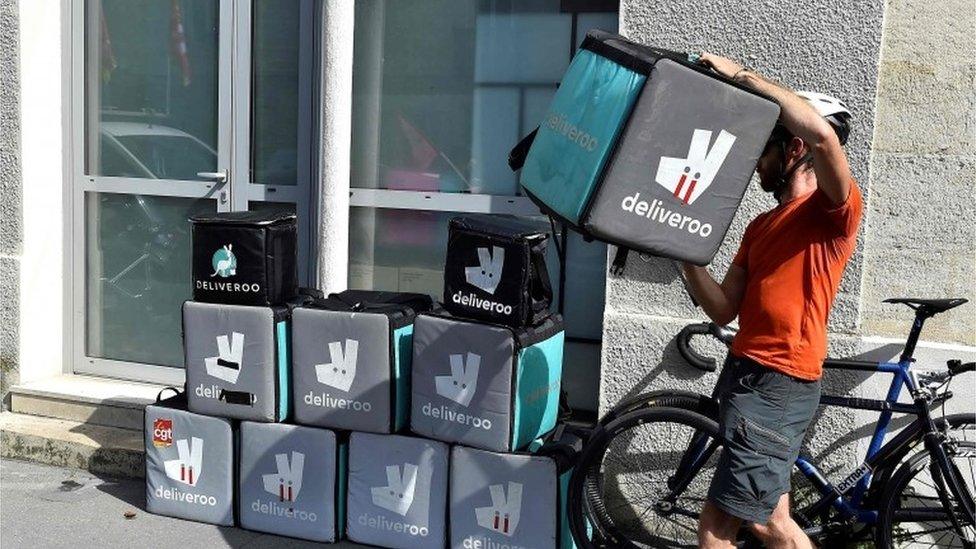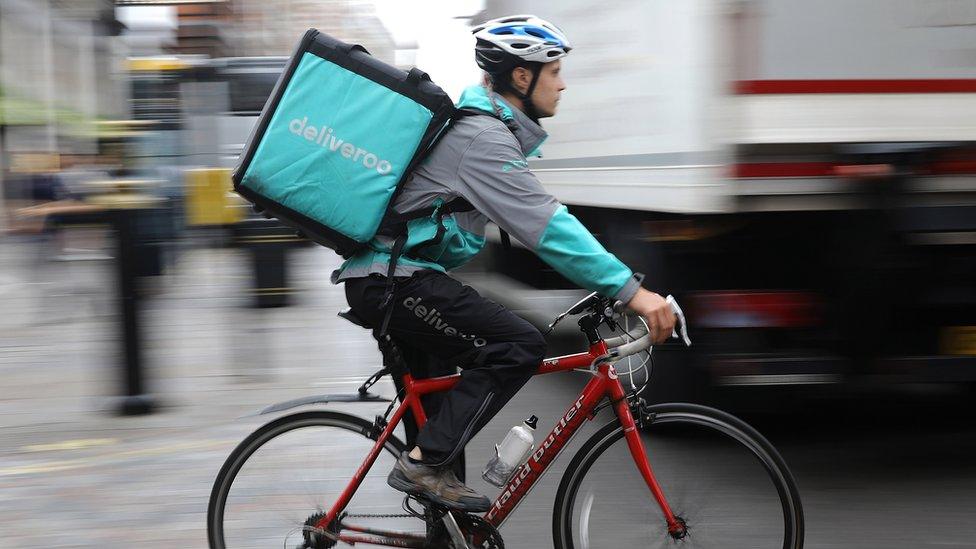Deliveroo not forced by law to engage with unions, Supreme Court rules
- Published
- comments

Deliveroo cannot be legally compelled to engage with a union representing its riders for the purposes of collective bargaining, judges have ruled.
The decision is the latest in a long-running dispute, which began when a union tried to represent a group of riders over pay and conditions.
The case was previously dismissed by lower courts but an appeal was brought to the Supreme Court.
However, judges at the Supreme Court unanimously dismissed the appeal.
Judge Vivien Rose said Deliveroo riders did not have an "employment relationship" with the food courier company and were not entitled to compulsory collective bargaining.
In a judgement, Lady Rose, along with Lord Lloyd-Jones, said multiple factors, including riders being free to decline offers of work and to work for Deliveroo's competitors, were "fundamentally inconsistent" with such a relationship.
Collective bargaining is an official process in which trade unions negotiate with employers on behalf of their members.
The Independent Workers Union of Great Britain (IWGB), which brought the case, said the ruling was a disappointment.
"As a union we cannot accept that thousands of riders should be working without key protections like the right to collective bargaining," it said in a statement, adding it would continue to explore legal avenues.
"Whether reflected in legislation or not, couriers are joining the union in ever bigger numbers and building our collective power to take action and hold companies like Deliveroo to account," it added.
The case follows a number of claims brought by workers in the so-called "gig" economy in recent years, demanding rights such as holiday pay, the minimum wage and pensions contributions.
In 2017, the IWGB was first refused permission to represent riders on the basis they were not classed as "workers" under UK labour law.
It put forward a legal case, but riders were ruled to be self-employed by labour law body the Central Arbitration Committee (CAC).
The union has since been mounting a number of appeals, reaching the Supreme Court.
Part of the case, which was rejected on Tuesday, focused on whether the arrangement between the food courier and its riders fell under the scope of Article 11 of the European Convention on Human Rights - which covers the right to join trade unions.
But judges rejected this argument.
The Supreme Court has said there is nothing in UK legislation to stop riders from forming or joining a union, and nothing to prevent Deliveroo engaging in collective bargaining with it.
But its ruling added: "The issue is whether Article 11 requires the United Kingdom to go beyond that current position and to enact legislation conferring on Article 11 workers the right to require their reluctant employer to recognise and negotiate with the union of their choice."
A Deliveroo spokesperson said that the UK had "repeatedly and at every level" confirmed that its riders are self-employed.
"This is a positive judgment for Deliveroo riders, who value the flexibility that self-employed work offers," the spokesperson added.
However, the IWGB argued: "Flexibility, including the option for account substitution, is no reason to strip workers of basic entitlements like fair pay and collective bargaining rights."
Deliveroo said it had agreed a "voluntary partnership agreement" with the GMB Union in 2021 which gave the union collective bargaining rights on pay and consultation rights, on benefits and other issues, while still recognising riders as self-employed.
Related topics
- Published5 December 2018

- Published14 November 2017
